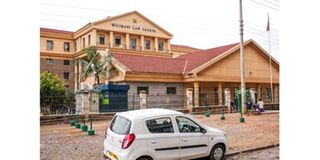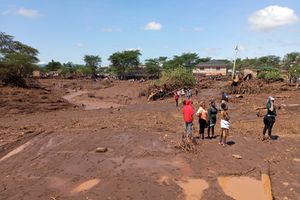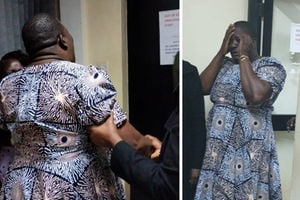Lobby calls for change of tack in SGBV probes

Milimani Law Courts in Nairobi on July 22, 2020.
What you need to know:
- Mulika Wabakaji conducted a scenario mapping in Nairobi slums, which indicated that there would be mass exodus of people from the city to the countryside.
- In the worst case scenario, they anticipate limited access to essential services for SGBV survivors because of restricted transport systems.
Mulika Wabakaji consortium has called on the government to institute mechanisms that will guarantee conviction of perpetrators of sexual and gender-based violence (SGBV) in the run-up to the general election.
Speaking during an event held in Nairobi on Monday last week, Florence Mwikali of Peace Brigades International noted that their findings in six slum areas of Nairobi showed that SGBV increased during the electioneering period owing to the shift in focus to the process itself away other key functions such as security.
Ms Mwikali said the lobby group had conducted a scenario mapping in Kibera, Mathare, Kawangware, Mukuru kwa Njenga, Maili Saba and Lang’ata, which indicated that there would be mass exodus of people from the city to the countryside.
In the worst case scenario, they anticipate limited access to essential services for SGBV survivors because of restricted transport systems. Further, they anticipated that medical workers who have been targeted in the past may opt to leave, also limiting SGBV survivors' access to medical care.
Funding
Margaret Adhiambo, the gender programmes coordinator at Shining Hope for Communities (Shofco), implored the government to increase funding for safe houses to expand their capacity to respond to the needs of SGBV survivors.
She urged the government to create specialised courts that deal with such violence to ensure quicker resolution and convictions. "The government has done a lot in prevention of and response to SGBV. However, an increase in legal aid support for survivors would enable them to get justice faster," Ms Adhiambo said.
Naomi Barasa of the She Main Table reiterated that rape and defilement are usually used as weapons against women when crises arise as seen during the 2007/08 post-election violence and at the height of Covid-19.
"It is very urgent that we all become part of this discourse because SGBV cuts across age, religion and social status," stated Ms Barasa.
Media intervention
She called on the media to assist the lobby group to monitor SGBV cases arising before, during and after election.
"Monitor police behaviour to ensure they are not perpetrators of SGBV. Also, expose perpetrators who hold powerful positions and who may hinder a survivor's quest for justice," she said.
Fear to report; lack of information on how to access medical, legal and other forms of psychosocial support; stigma; lack of trust in the police service; and cover-ups at the family level were named as some of the reasons limiting survivors’ access to justice.
To further their work on monitoring SGBV during this electioneering period, the lobby announced that it would be engaging the National Gender Equality Commission, the Kenya National Commission on Human Rights, the National Cohesion and Integration Commission, and the Independent Electoral and Boundaries Commission.





